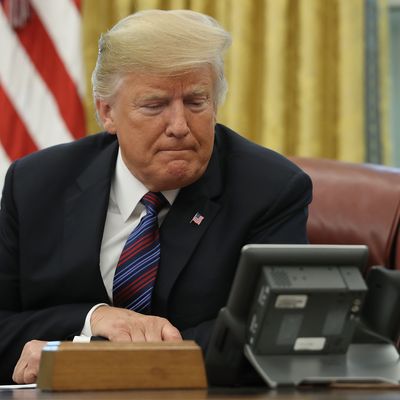
The first week of the new year was shaping up to be a scandalous one for Donald Trump, after a recording of a phone call was released on January 3, in which the former president pressured Georgia’s Republican secretary of State Brad Raffensperger to “find” enough votes to tip the state in his favor. Three days later, the Capitol riot obliterated the potentially impeachable offense from the news cycle. But that doesn’t mean that Trump’s campaign to steal the election will totally escape scrutiny.
On Monday, Raffensperger announced that he was opening an inquiry into Trump’s attempts to overturn the vote count in Georgia, which the secretary of State’s office described as “fact-finding and administrative in nature.”
Once the results of the investigation are in, its findings will be sent to Georgia’s Republican-controlled board of elections, which will decide whether or not to give them to the state attorney general to prosecute. The board’s only Democrat, David Worley, said on Monday that the authority would be taking the matter seriously. “Any investigation of a statutory violation is a potential criminal investigation depending on the statute involved,” he said, adding that “the complaint that was received involved a criminal violation.”
As Raffensperger’s office stated, their current project is not a criminal inquiry. However, the “fact-finding” mission has plenty of potential material to parse: The hour-long call with Georgia’s secretary of State was Trump’s 19th attempt to reach out after the election, while Trump also pressured an election investigator in Cobb County around the same time. And as the New York Times notes, Trump may have wandered into criminal territory in his conversations with Raffensperger:
Former prosecutors said Mr. Trump’s calls might run afoul of at least three state laws. One is criminal solicitation to commit election fraud, which can be either a felony or a misdemeanor; as a felony, it is punishable by at least a year in prison. There is also a related conspiracy charge, which can be prosecuted either as a misdemeanor or a felony. A third law, a misdemeanor offense, bars “intentional interference” with another person’s “performance of election duties.”
The secretary of State’s inquiry in Georgia is hardly the only effort looking to hold Trump accountable in his life after the presidency. Fani Willis, the district attorney of Fulton County, which includes much of Atlanta, is considering a potential criminal inquiry into the former president for his attempt to pressure officials to overturn the election. In New York, the state attorney general and Manhattan district attorney are looking into Trump’s many alleged instances of tax fraud. And on Tuesday, his second impeachment trial will begin.






























